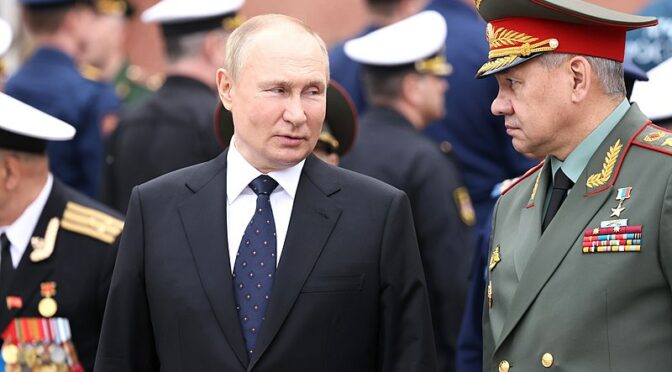Article published in The Daily Telegraph, 27 September 2022. © Richard Kemp
Putin’s latest nuclear threats signify above all that he is in grave danger at home. It was intended not just to cow the West but also to show strength to his henchmen who think he’s not been tough enough in Ukraine and to warn the plotters in Moscow that he will stop at nothing to hold on to power, no matter how many must die in the process.
His intended annexation of the areas of Ukraine now occupied by Russia means he could lawfully use nuclear weapons to defend them as they will formally be part of the Russian Federation. The fact that no other country will recognise Moscow’s sovereignty is beside the point – seen from the Kremlin, an attack on these areas with Nato munitions will be an attack on Russia itself.
Whether or not Putin was bluffing about using weapons of mass destruction – and we shouldn’t forget he also has a large chemical arsenal – his threat was a sign that he is running out of options in this war. Battlefield nuclear or chemical strikes could be a game-changer, inflicting severe physical and psychological damage on the Ukrainian defenders.
They would also have the potential for uncontrollable escalation, perhaps violently engulfing the whole of Europe and even beyond. The US president was right to publicly threaten catastrophic consequences for Russia if Putin used nuclear weapons and he would be right to inflict such consequences if his warnings went unheeded. In military terms that can only be direct NATO intervention in Ukraine or strikes against key targets inside Russia. Either would mean a Europe-wide war.
The White House says it has ‘communicated directly, privately to the Russians at very high levels’ how it would respond if Putin took the nuclear option. That message will have been delivered to others in the nuclear command chain, including the defence minister and chief of staff of the armed forces. We can only hope that it was sufficiently robust and that they took it seriously enough to deter them. The latter cannot be taken for granted among senior figures who consider the Biden administration and Nato to be toothless, a view reinforced by the debacle in Afghanistan last year and the French flight from Mali this year.
Deterring those who are responsible for carrying out Putin’s orders, and who themselves want to survive, is now critical and could literally save the world if an attack order is disobeyed. Refusal by his subordinates to implement instructions for a nuclear strike would also spell the end for Putin. He knows that and will not issue the order unless he is confident it will be executed, hence the need for American messaging to hit home.
Putin’s end may anyway come sooner rather than later. The political and military elites in Moscow can now see they are backing the wrong horse. Aside from growing reluctance inside the country to support mobilisation for war, Russia’s most important allies among former Soviet states in Central Asia and the Caucasus have been distancing themselves from Moscow. Putin has also lost the confidence of his strongest overseas partners including India, whose president publicly admonished him in Samarkand this month, saying: ‘Today’s era is not of war.’ Turkey’s president, Erdogan, who has been playing a double game since the invasion begun, told Putin that Crimea – Moscow’s most important possession in Ukraine – must be returned to Kyiv.
Even the tight-lipped Xi, Russia’s most significant ally, has been more free-spoken over the invasion in private, to the extent that Putin was forced to acknowledge his concerns in public two weeks ago. Just as Washington’s communications with Russia’s senior leadership is vital for staving off escalation, so is Western diplomacy among Moscow’s allies, persuading them to toughen their own stance against Putin’s nuclear menacing. The message here is not for Putin, since he is hoist by his own petard and cannot climb down unless Ukraine comes to terms, but for the political and military elites, who may be able to kick the ladder out from under him.
Even that could be a double-edged sword. The end of Putin does not necessarily mean the end of the war, or even an improved situation. What happens next depends on which factions seize power. There are some in Moscow who want to find a way to finish it on terms that minimise the damage and humiliation to Russia and save their own skins and fortunes, but there are others who want the same thing Putin wants but believe even greater violence is needed to bring it about.
Image: Putin and defence minister Sergei Shoigu. Source: Wikimedia Commons

